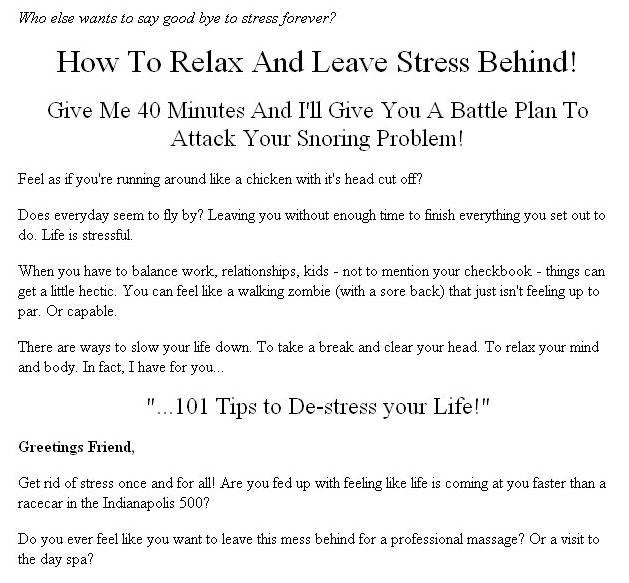Salespage Snapshot

PLR Ebook Table Of Contents
INTRODUCTION 4
Stress Research 4
Identify Stress in your Life 5
Your Stress Diary 6
– analyze your diary
– what does it all mean
Powerful Stress Management Tools 7
Manage Stress through Mental Imagery 10
Physical Relaxation 11
– deep breathing
– progressive relaxation
– relaxation response technique
Rational and Positive Thinking 13
– thought analysis
– change negative thinking
– using thought awareness
Bust Stress Away 15
Laugh Stress Away 18
Self-Therapy for Nagging Daily Stress 19
– aching back and muscle tension
– sooth the mid-section
– for the multi-tasker
– for those on the go
– for a good nights sleep
Natural Stress Busters 22
Another Good Remedy for Everyday Stress 27
Relaxation and Scent 30
De-Stress your Home 33
Create a Home Spa Experience 36
More Good Relaxation Tips 38
How do Others Deal with Stress 40
– Three random responses
Controlled Breathing 42
– Exercise
Targeted Relaxation 42
– five finger exercise
– progressive relaxation
– calm the racing mind
– instantly de-stress
– deep relaxation
– quieting of body and mind
– higher level relaxation
Stress Self-Assessment 48
Conclusion 51
Ebook Sample Content Preview
INTRODUCTION
For the past one hundred years there has been much debate and theory offered about what stress is and what stress is not. We each know intuitively what stress is to us because we all experience it. Defining stress, however, is not so easy.
Hans Selye is one of the founding fathers in stress research. In 1956, Mr. Selye argued that “stress is not necessarily something bad – it all depends on how you take it. The stress of exhilarating, creative successful work is beneficial, while that of failure, humiliation or infection is detrimental.”
Selye’s position was that the biochemical effects of stress would be experienced irrespective of whether the situation was positive or negative.
Since that time, much more research has been conducted, and new ideas have evolved. Stress is now widely perceived as a “negative,” producing a range of harmful biochemical and long-term effects. These same effects have rarely been observed in positive situations.
Richard S Lazarus is attributed with our most commonly accepted definition of stress: Stress is a condition or feeling experienced when a person perceives that “demands exceed the personal and social resources the individual is able to mobilize.”
Everyone responds differently to stressful events. That stress response is part instinct and part to do with how we think. We can train our minds how to best respond to the stressors in our lives. Stress does not need to be all bad. Some stress in our daily lives is good and challenges us to reach even higher heights.
This ebook is dedicated to helping people, everywhere, to harness the stress in their lives and channel it into something that is beneficial and positive.
Other Details* Sales Page: Included, HTML
* File Format: MS Word Doc, PDF, RTF
* Number of Pages: 50
* Download File Size: 275 KB













